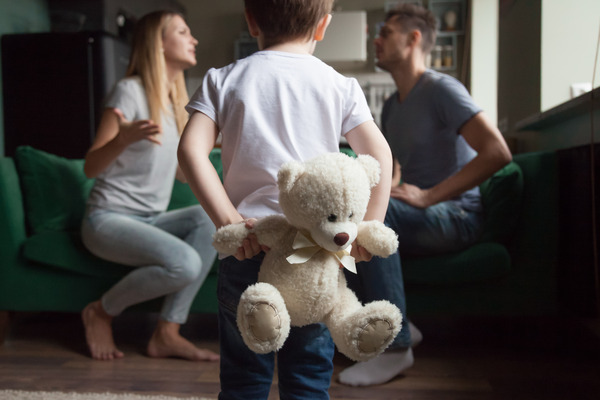In this article we will try to explain how parental separation can influence children depending on their age and also the different circumstances or factors that can aggravate…
In this article we will try to explain how education can influence children. parental separation depending on their age and also the different circumstances or factors that can aggravate or attenuate the entire emotional process involved, as well as some recommendations to help parents in this process.
How does divorce affect you?
Recent studies (Cantón et al., 2007) seem to suggest that the separation or divorce of parents have important negative effects on the children who suffer from it. Practical experience tells us that this is the case to a certain extent, since the amount of negative effects and their intensity do not depend so much on the separation itself, but on the management and the way in which said breakup has been managed, on the age of the child, his temperament and other circumstances in his environment. Below are some of the most common reactions.
If we talk about children aged between 2 and 6 years, they may appear alterations in the pattern of eating and sleeping, apathy, introversion, silence when facing new people, difficulties relating or playing, somatic complaints such as headache, stomach pain, etc. unjustified and even refusing to go to one of the parents’ house. At these ages it is also common, especially in the youngest children, for regressive behaviors to occur such as peeing in bed again, thumb sucking, infantilism, wanting to sleep with parents, fears, anxiety, etc.
Also tantrums, need to constantly attract attention, separation anxiety (when leaving it at school or others). Excessive bonding usually with the mother who seems overwhelmed and does not understand what is happening. Sometimes, the child goes from aggressiveness or contempt to seeking unconditional affection (hugs, kisses, promises that she will behave well, etc.). These regressive behaviors can also appear or be maintained in children between 7 and 12 years old, although to a different degree. In this case, by having greater verbal resources, other types of reactions appear, which in a certain way helps them to express their feelings.
Some behaviors are manipulation , the contempt or resentment of one of the parental figures at the same time that they idealize the other (emotional asymmetry), an asymmetry that can be aggravated depending on the attitude that the adults take towards the child. Furthermore, if the children continue not to accept reality, behaviors and behaviors that recriminate the parents may arise in the hope of trying to unite them again.
On the other hand, feelings of guilt, risky behavior, low self-esteem, difficulties in relationships with peers, low tolerance for frustration, aggressiveness, impulsiveness and a drop in academic performance are common characteristics at these ages. Adolescence is another difficult stage. Is a stage of many changes for them, to which, in addition, a separation must be added, it becomes even more complicated. With a separation during this stage, risk behaviors such as alcohol and drug consumption may increase. Also promiscuity in sexual relations and the need to bond emotionally with a partner in the case of girls, etc. Impulsiveness and difficulty resolving conflicts without aggression is usually another characteristic present at this stage.
Recommendations for communicating the separation
Once exposed behaviors that could be observed in children depending on the stage in which they are, we are going to provide a series of recommendations that can be very useful to present the decision to children, but above all to be aware of the effects it can have on children the way they handle separation.
When the emotional ties in a marriage are broken, it is always a painful process and that it is experienced with a certain anguish on the part of the members of the couple who, now, see the common project broken. Despite this, the main “victims” of any breakup process are the children, especially the youngest ones. That is why the way in which the separation is communicated will be decisive in whether more or less adaptive feelings begin to be mobilized in the child.
1. Make a forecast
Before communicate to children When making the decision, parents must have certain aspects in mind that will be crucial for the child’s adaptation to the new situation. Such aspects are, who will be the parent who leaves the home, what will be the times and days on which visits, calls, etc. will be established. as well as answer any questions that may arise for the minor. Parents must report the separation together and must do so in language that is as clear and simple as possible so that the children understand it. They must know that they will be able to enjoy both parents whenever they want, together or separately. It is very important that the children are clear that the separation is not going to affect the affection that each one has for them, and this will only happen if they manage to convey to them that the only thing that changes are the bonds of marriage, while others such as paternal-filial ties, phratry ties (between siblings), etc. they remain. (The lack of verbal information prior to parental conflicts produces a state of anguish, helplessness and disorientation in minors. The information helps them understand and prepares them).
2. Show respect
Parents must show mutual respect and avoid blaming each other so as not to show the child the negative feelings they have about each other. If this is not the case, the children may be “forced” to take sides with one of the two, and we must not forget that children need both parents. What’s more, if the parents find themselves immersed in a judicial process, it is very important that they do not devalue the other’s capacity as a caregiver, since the only one harmed will be the child. A separation is not going to cause irreversible damage to the children; with a little time, and sometimes with the help of a professional, they can successfully overcome the crisis. But if, on the contrary, the children are involved in the marital conflict, even before the breakup, intergenerational alliances may appear, causing damage and alterations. If instability continues (or begins) after separation, it is likely that children will express the conflict with various symptoms. (Whether this situation occurs or not, it is extremely necessary to encourage children to express their feelings, accepting them while maintaining a calm attitude, even if they are angry). Of course, the more emotionally stable the parents are, the better they will be able to respond to the needs and demands of their children that arise after separation.
3. Collaborate with each other
Behavioral problems, learning disorders and emotional instability will be the main consequences for children the greater the discrepancy between parents. A high conflict intensity Parenting is associated, more than with the breakup itself, with difficulties in the children’s emotional adjustment; therefore, so that these difficulties do not appear, parents must have the ability to collaborate in family reorganization; maintain proper discipline; preserve the rituals; and guarantee children a minimum of emotional security.

4. Don’t blame the children
It is absolutely necessary that parents focus on meeting the demands of their children instead of turning the separation into a battle in which in the end no one will really win, and in which there will undoubtedly be victims, the children. They must be attentive to the signs of guilt that they may show. Sometimes, as adults, we will think that unconsciously, they charge against the children making them believe that they are responsible for what happened, and we cannot let this happen. Children should not be blamed nor should we let them blame themselves. The younger the child is, the more they are perceived as the center of the world, therefore they will think that they may be the cause of the separation. Once again, the need to make children understand that separation has to do exclusively with the parents’ life together and not with the parent-child relationship is reiterated.
5. Don’t speak badly of others
On the other hand, parents must speak well of the other parent or, at the very least, not speak badly. Children they need to have a healthy image of both parents to be able to grow up with adequate self-esteem and with the correct identification figures. The minor feels part of dad and part of mom, and speaking badly of one of the two is speaking badly of the minor himself. An erroneous attitude with serious consequences for the child’s development, which parents also tend to fall into, is to be excessively on top of them, always paying attention to what they are doing, and going everywhere together. Children should not become substitutes for our ex-partners.. It also doesn’t help them that we ask them to stay with us because we feel alone, we must have our own resources to get ahead, without creating dependency or guilt. No less important is to keep in mind that children are not judges, we should not place them in that situation, nor share details of our intimate life or separation with them. Nor should they question the ex-partner’s attitude in front of them or ask their opinion on these issues. Adults’ things should stay between them, and minors should always keep a good image of both parents.
6. Don’t use them as messengers
Finally, it is very important not to use children as messengers. When something needs to be communicated to the other parent, it must be communicated in first person , whether by phone, letter, email… . The “messages” of the type: “tell your mother/father…”, “when you go home bring me and unpleasant that in the long run will distance them from us.
In short, although parents feel difficulties speaking to your children about your decision to separate, they must understand that it is your opportunity to help your child endure the crisis that is coming. In this way, dreams of reconciliation are avoided, among other things. Communicating the news will not prevent their suffering, but it can help them overcome the situation little by little. For them, separation is one of the most stressful events they can encounter. The minor experiences a pronounced feeling of vulnerability. His trust in the continuity and protection of the family is abruptly broken. Fears and anxiety appear, they feel an intense fear of being abandoned by their father, they fear that he will lose love for them, and the infrequent visits in the first days of separation serve to reinforce these fears. Hence, parents must take this process with the importance it deserves for the emotional well-being of their children.









